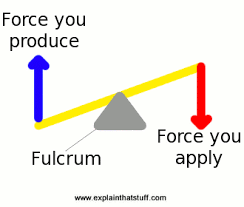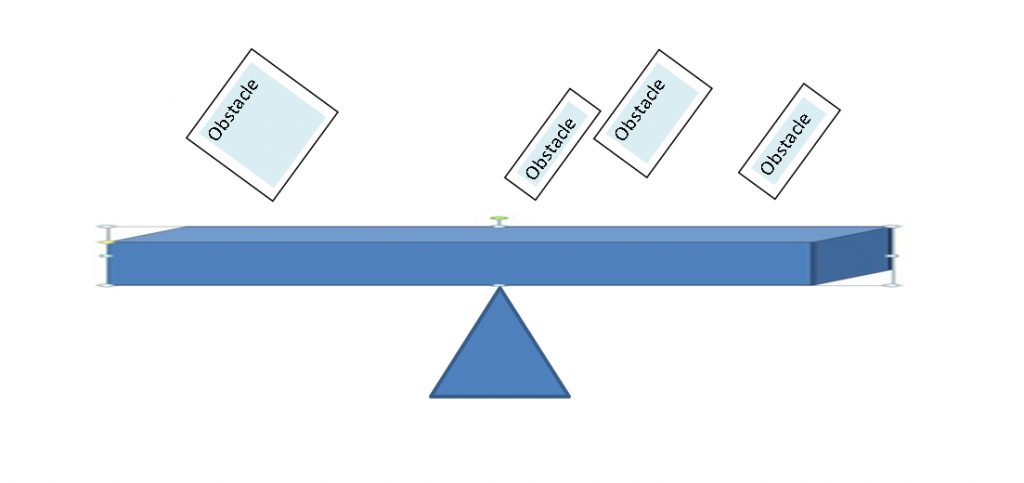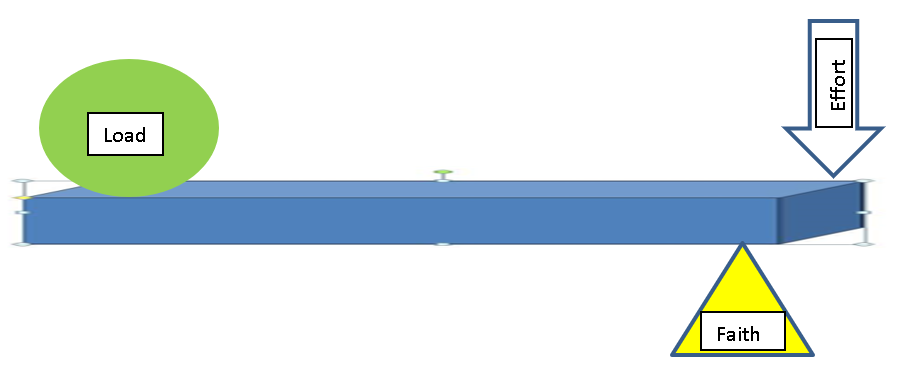Faith Working as a Fulcrum
From our study of God’s Word this year, we conclude that biblical faith is a way of reasoning about time, events and eternity. Faith works on our mind – our reasoning. Like our spiritual mentors in Hebrews 11, our patterns in reasoning and our behavior will indicate God is working supernaturally in us. Reasoning with faith is a way of thinking that only God can put in place.
Faith reveals to us that the worship of Yahweh – the God of the Bible – is the structure believers apply to the tangible and material realities in our everyday life – what we call the “real world”. Although we cannot escape contact with material situations, faith is a pattern of dealing with God first and directly that helps us resist predicting an outcome solely on material circumstances. Faith is a way of thinking synchronized by the Word of God and detached from our circumstances.
One might ask, “How can anything immaterial impose an influence on my very tangible life?” There is no ‘logic’ that can explain my very real, tangible world being made out of things that are invisible. What human rationale can explain the living Isaac coming into being from a mother, old and barren, and the father “as good as dead?”
The redundant expression “by faith” in Hebrews 11 emphasizes the personal strategy to be used to displace our natural logical reasoning and implement supernatural coherence.
“This is the fulcrum of faith. Human natural reason is a gift from the Lord. It holds stupefying capacities. It is not to be despised. But it also contains a danger. Natural reason, if not controlled, will put limits on revealed meaning and will constrain the reach of faith.”
(The text quoted here and thoughts summarized up to this point are from the teachings and writings of Dr. Latayne Scott, author of The Hinge of Your History The Phases of Faith)
In other words, the personal implementation of faith acts as a fulcrum for one to displace natural reasoning with supernatural coherence.
Dr. Scott’s word choice created a visual for me. Imagining faith as a fulcrum for my lever arm of life to pivot on, makes visual sense. Let me try to explain.
A lever works as a simple machine because it reduces the amount of force (work) needed to move an object or lift a load. Levers neither increase nor decrease the amount of total effort necessary. Instead, a lever makes the work easier by spreading out the effort over a longer distance. But a lever needs a fulcrum to transfer the work.
A fulcrum is described as a point a lever rests on or is supported and upon which the lever pivots. A fulcrum plays a central and essential role in an event or situation. The fulcrum is where the load on the lever is pivoted. The position of a fulcrum on a lever affects the effort, or force, needed to do a certain amount of work. The closer the fulcrum is to the load, the less effort is required to lift the load. The big idea with a fulcrum is that it is a force multiplier.

Generalizing this concept
Imagine a lever arm as your walk in life. Along life’s walk there will be obstacles to faith. These struggles can originate from work, family, a health crisis, financial and family difficulties or caused from a myriad of other things. The size and duration varies.

As a Christian and Jesus follower, we know our life should be supported by faith. But where the fulcrum of faith is placed makes a huge impact.
Luke 8:22-25 records a day in the life of Jesus’s disciples. During this event, their faith seemed placed in the natural representations of a mighty storm. Their eyes could see the storm, their skin felt the sting of the storm, and they felt the violent tossing of the boat and past tragedies ran through their memory. They probably worked very hard at rowing and balancing the load until finally they woke Jesus shouting, “Master, we are going to drown!” After Jesus rebuked the wind and raging waves and there was calm, He asked his disciples, “Where is your faith?
When faith is in our own efforts, reasoning and natural representations the fulcrum is too close to my own effort and forces. The storm and load at the end looks overwhelming.

There is a heavy load – our metaphorical mountain – that needs to be moved. But when faith is in my effort, I can barely influence the problem. As I push on the effort end of the lever, the load end is wobbly and teetering. The intensity on either extreme is magnified. The perception of the problem is deceiving. It’s possible to apply enough force to the problem to lift the load; however, the result is a loss of stability, steadiness, peace and discernment.
What if faith in God’s promises and character is nearer to the crisis? What if I manage my faith and God manages the crisis? Remember, the personal implementation of faith acts as a fulcrum for me to displace natural reasoning with supernatural coherence.

The image looks like this:
With my “effort” of obedience and faith (as small as a mustard seed) in God’s promises and character, I can lift a heavy load with very little human intervention. Remember a fulcrum is a force multiplier. Our natural selves want to focus on the length of the lever – the size of the problem – instead of the fulcrum. If I can supernaturally focus on the reach and placement of my faith – the results become fruitful and productive for my Christian walk.
A mechanical fulcrum plays an essential role. The fulcrum is where the load on the lever is pivoted. The position of a fulcrum on a lever affects the effort, or force, needed to do a certain amount of work. The closer the fulcrum is to the load, the less effort is required to lift the load. The big idea with a fulcrum is that it is a force multiplier.
A spiritual fulcrum of faith acts in a similar manner. On the faith fulcrum, life’s load pivots and transfers effort, fear and uncertainty to God. Now we can deal first and directly with the almighty God “who will cause everything to work together for the good of those who love Him and are called according to his purpose for them.” Romans 8:28
Living by faith means being prepared to deal with God first and directly so God’s Word
can be linked to the material circumstance. Like our faith mentors in Hebrews 11, we can be willing to face risks and defy normative human reasoning. As believers set apart for God, our patterns in reasoning and our behavior will indicate God is working supernaturally in us.